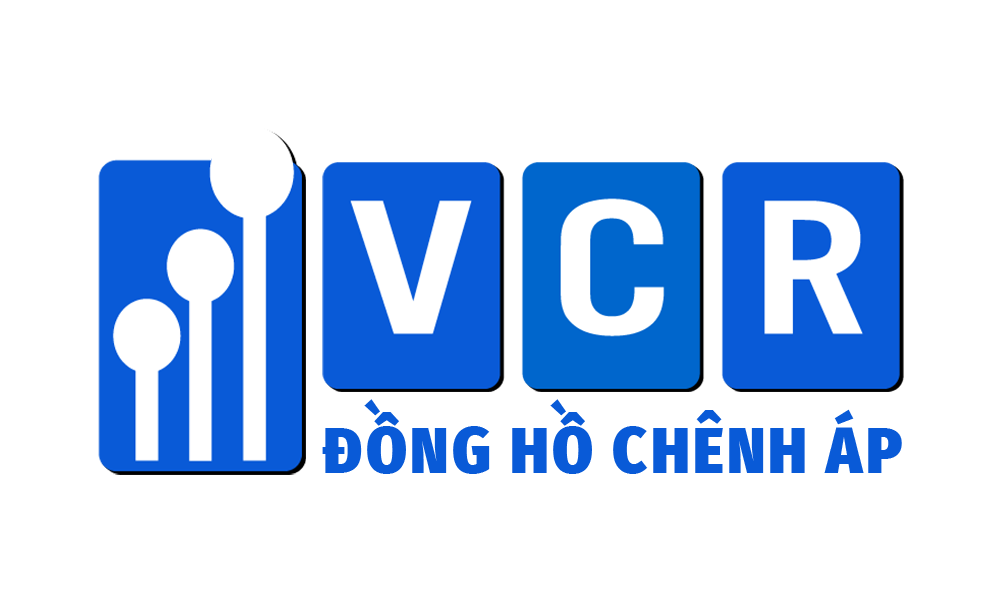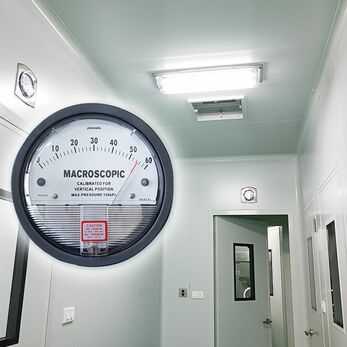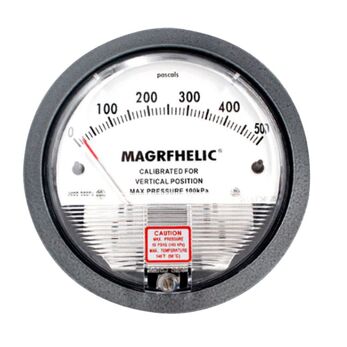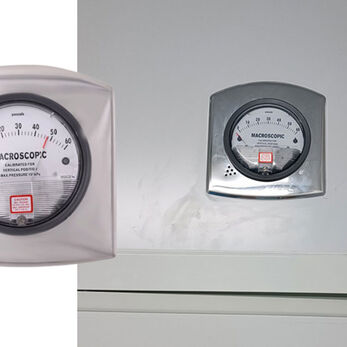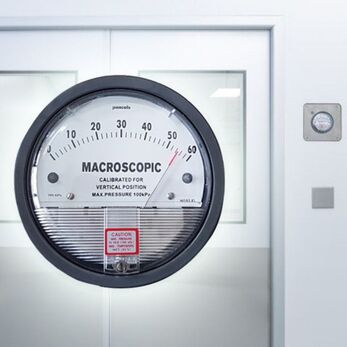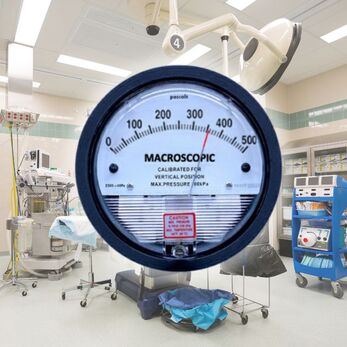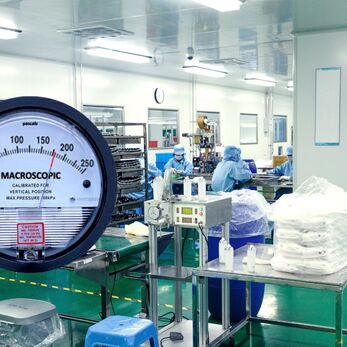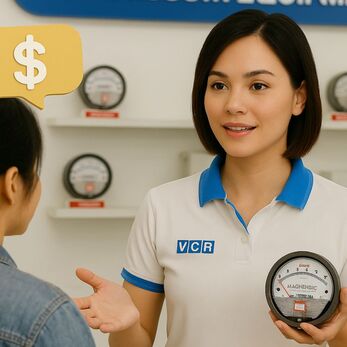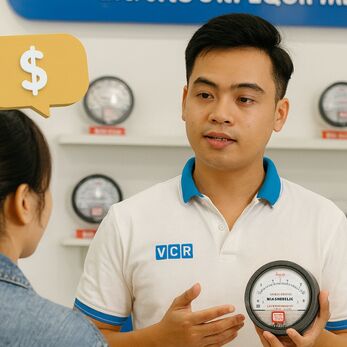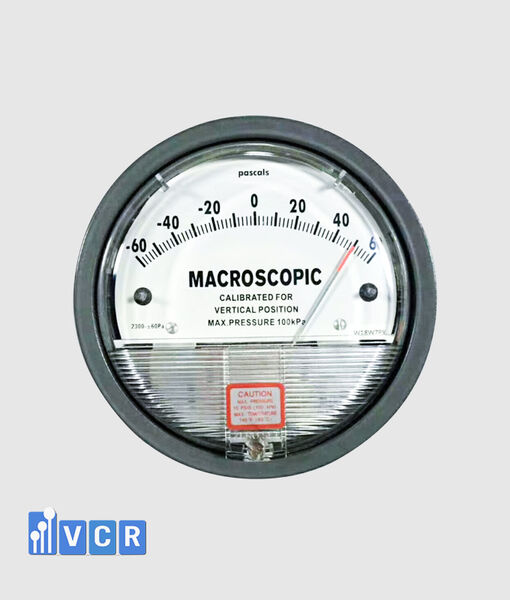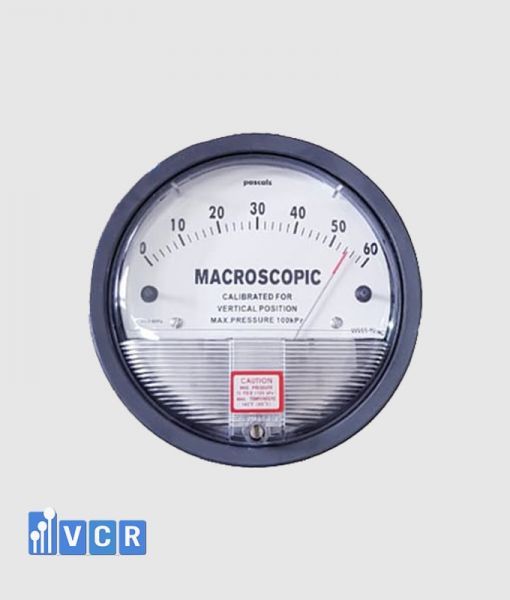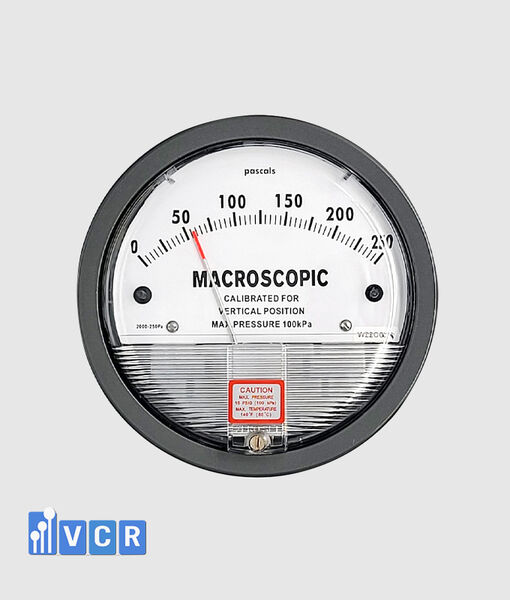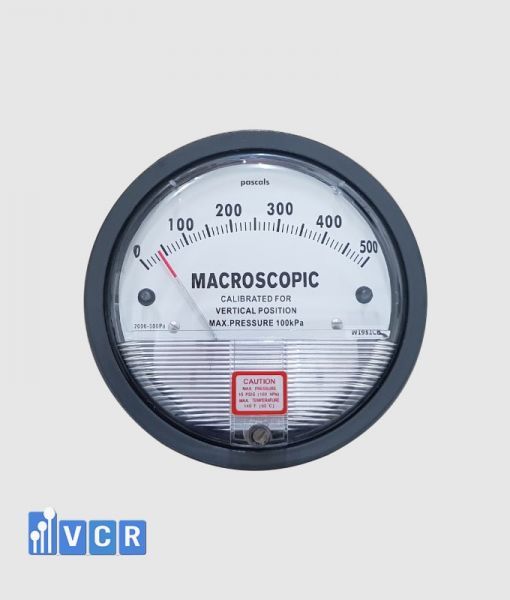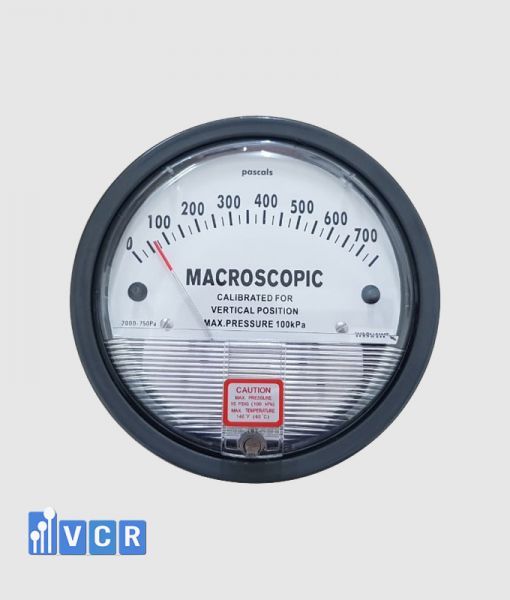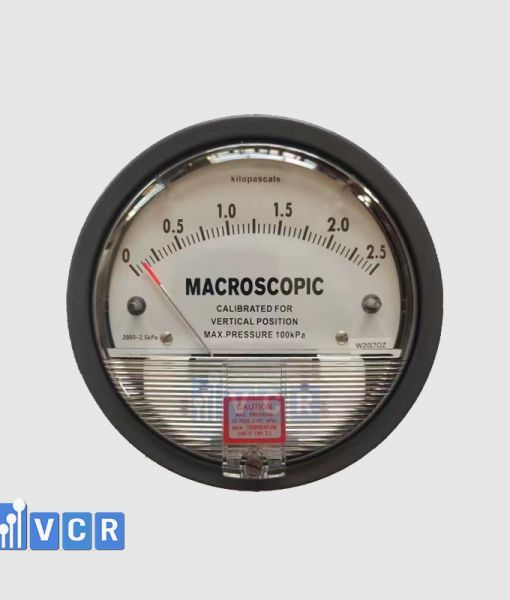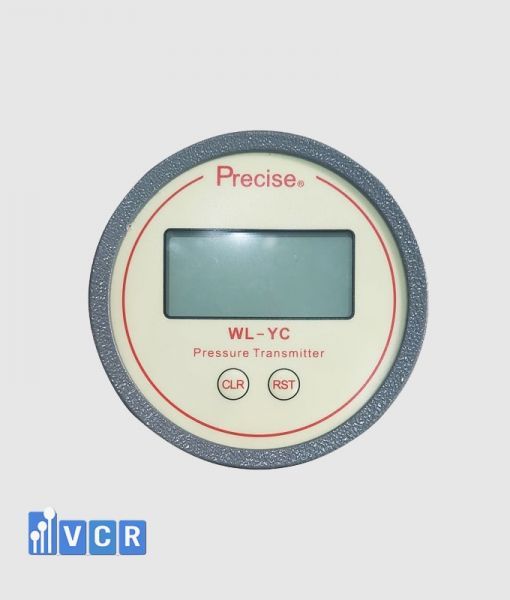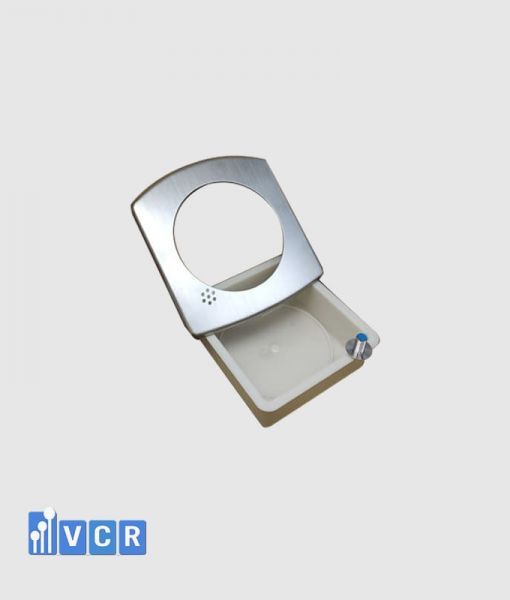In the food industry, controlling differential pressure between zones is a key factor to ensure GMP, HACCP, and ISO 22000 standards. Differential pressure gauges help monitor pressure differences accurately, prevent cross-contamination, and maintain a clean, safe environment for food production.
- 1. Introduction overview
- 2. Criteria for Choosing a Supplier of Differential Pressure Gauges
- 3. Benefits of Selecting the Right Supplier
- 4. VCR – Specialized Supplier of Differential Pressure Gauges for Food Clean Rooms
- 5. Frequently Asked Questions (FAQ) – Differential Pressure Gauges in Food Clean Rooms
1. Introduction overview
In the food processing industry, quality control and hygiene are mandatory to ensure that end products meet GMP, HACCP, and ISO 22000 standards. One of the critical elements in cleanroom control systems is the differential pressure between zones. The differential pressure gauge is a device that continuously and precisely monitors this parameter.
This device measures the pressure difference between two spaces - for example, between the main production room and a corridor - thereby ensuring that air only flows in the desired direction, preventing cross-contamination from microbes, dust, or harmful gases. This is especially important in areas such as:
-
Fresh raw material processing
-
Finished product packaging rooms
-
Filling and mixing zones
Maintaining positive pressure (higher than surrounding areas) in critical zones protects the product from external contamination.
Why choose a reputable supplier of differential pressure gauges?
It’s not just about buying a device - selecting a trustworthy supplier is crucial to ensure:
-
Absolute measurement accuracy, which directly affects the ability to maintain a proper clean environment
-
Operational safety via correct installation, periodic calibration, and timely alarms
-
Compliance with food industry standards (GMP, ISO, HACCP) - especially during internal audits or audits by clients
A professional supplier will not only sell the device but also advise on placement, supply full technical documentation, and support calibration - helping to maintain stable operation of the cleanroom system.

Read more: Cleanroom differential pressure gauge: How to read and calibrate according to ISO standards
2. Criteria for Choosing a Supplier of Differential Pressure Gauges
Choosing the wrong device or supplier may lead to serious consequences: pressure deviations, microbial cross-contamination, audit nonconformities, or even production halts. Here are four key criteria to help food companies evaluate differential pressure gauge suppliers:
Experience in food clean rooms
Not every supplier understands the strict requirements of the F&B (food & beverage) sector. Give priority to suppliers with real implementation experience in:
-
Meat, seafood, dairy processing plants
-
Frozen food packaging lines, canned goods factories
-
Beverage, nutraceutical filling zones
Suppliers with case studies will better understand GMP standards, clean air flows, and pressure control zones, and can give precise consulting from the start.
Authentic products with full documentation
Differential pressure gauges are precision instruments and require reliability. Be sure that:
-
The device comes with CO (Certificate of Origin) and CQ (Certificate of Quality)
-
It is from a reputable manufacturer (U.S., Germany, Japan, or official domestic brands)
-
The supplier provides full technical documentation, wiring diagrams, user manuals
Additionally, the supplier should offer calibration and validation services or connect with a recognized calibration center to ensure measurement validity.
Technical support & GMP-appropriate design consultation
A reputable supplier does more than sell - they remain a partner throughout the project lifecycle:
-
Advising optimal installation locations to avoid pressure distortions or air recirculation
-
Guiding how to read gauge scales, check errors
-
Training basic maintenance for operation teams
This helps reduce technical errors and ensures pressure data remains accurate for quality control.
Reasonable pricing and ready stock
Price is important but must be balanced with quality. A good supplier should:
-
Provide clear quotations and volume discounts
-
Commit to warranty and transparent return policies
-
Maintain stock availability and support fast delivery for replacement or urgent installations
This is especially critical because food plants cannot afford lengthy downtime when equipment malfunctions.
Read more: How Differential Pressure Affects Airflow in Cleanrooms and Food Processing Areas
3. Benefits of Selecting the Right Supplier
Working with a professional supplier of differential pressure gauges not only ensures a quality device but also offers long-term benefits to food cleanroom operations:
Effective pressure control between clean zones
Accurately measured differentials act as the “guardian” of the cleanroom. With proper supply and installation, you can:
-
Maintain positive pressure between clean zones and buffer zones
-
Detect pressure anomalies quickly (due to leaks, fan failure, airflow misbalance)
-
Prevent cross-contamination from dirty to clean zones
This is especially critical in dairy, meat, and seafood plants where microbiological control is stringent.
Compliance with HACCP, ISO 22000, GMP food standards
A certified differential pressure gauge helps the company:
- Meet environmental control requirements in international standards such as HACCP, ISO 22000, GMP
- Ease licensing and audit approval processes, especially for export-oriented clients
- Enhance brand credibility and trust, especially when exporting products
Optimizing operational and maintenance costs
A trustworthy supplier will:
-
Provide correct usage instructions to extend equipment lifespan
-
Offer periodic calibration and maintenance services, reducing the risk of sudden failures
-
Stock spare parts to minimize downtime
This helps reduce maintenance costs, avoid production halts, and maximize ROI of the investment.
When you choose the correct supplier, you're not just buying a device - you’re investing in stability, safety, and sustainable growth for your food cleanroom system.

Read more: How Differential Pressure Affects Airflow in Cleanrooms and Food Processing Areas
4. VCR – Specialized Supplier of Differential Pressure Gauges for Food Clean Rooms
With over 10 years of experience in food cleanroom solutions, VCR is one of the leading providers in Vietnam specializing in measurement and precise pressure control equipment that meets GMP, HACCP, and ISO 22000 standards.
They not only distribute devices, but also deliver turnkey solutions from consultation to maintenance, meeting all differential pressure monitoring needs in food factories.
Featured product categories
Below are some widely used differential pressure measurement devices offered by VCR, suitable for various cleanroom configurations in the food industry:
| Device Name | Model | Origin | Typical Application |
|---|---|---|---|
| Magnehelic | Dwyer 2000 Series | USA | Flush or embedded mounting, local monitoring |
| Electronic Gauge | VCR-DAP | Vietnam | Connectable to BMS systems, remote monitoring |
| Pressure Calibrator | VCR-CAL01 | Germany | Used for routine calibration and verification |
All products come with full CO and CQ, seamless integration into existing cleanroom systems, and compatibility with sensors, display units, and control panels.
VCR Service Commitments
Free consulting & survey
VCR provides remote or on-site consulting, offers design solutions, and helps choose devices appropriate for different cleanroom cleanliness classes and production areas.
Installation support & operational training
Their technical team ensures GMP-compliant installation and trains operations personnel to interpret readings and troubleshoot basic issues.
Long-term after-sales & nationwide stock
- Warranty terms according to manufacturer guidelines (12–24 months)
- Ready stock of devices and spare parts across multiple warehouses
- Periodic calibration services with valid certificates across the country
Read more: Supplier of Differential Pressure Gauges for GMP Clean Rooms
5. Frequently Asked Questions (FAQ) – Differential Pressure Gauges in Food Clean Rooms
Q: Should I use mechanical or electronic differential pressure gauges in food clean rooms?
A: It depends on your monitoring goals and plant scale:
-
Mechanical gauges (e.g. Magnehelic, Dwyer):
• Pros: durable, simple installation, cost-effective
• Best suited for on-site monitoring where data logging is not required -
Electronic gauges (e.g. VCR-DAP):
• Pros: connect to centralized monitoring (BMS), data export
• Good for large plants with a central quality control or automation system
Q: How often should a differential pressure gauge be calibrated?
A: Recommended at least once per year. You may calibrate earlier if:
-
The device runs continuously 24/7
-
You have strict GMP or ISO audit requirements
-
The gauge shows measurement errors or abnormal readings
Calibration ensures ongoing measurement accuracy, reducing data deviations in quality control and audits.
Q: Can a differential pressure gauge be mounted on the outside wall?
A: Yes, in many cases it is feasible:
-
Mounted externally (surface-mounted) for ease of reading and maintenance
-
Use protective enclosures or dedicated flanges to maintain accuracy and appearance
VCR supplies various installation accessories optimized for different wall types and cleanroom panels.
Q: Does VCR provide calibration services?
A: Yes. VCR offers on-site calibration for both mechanical and electronic gauges using certified reference instruments. They also issue valid calibration certificates nationwide and provide reminders and maintenance support for loyal customers.
Contact:
Hotline: 090.123.9008
Email: [email protected]
Website: https://donghochenhap.com/
Dat VCR


